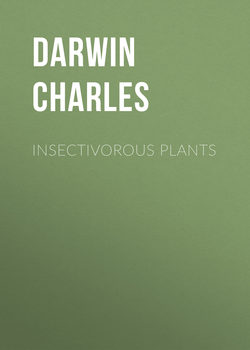Insectivorous Plants

Реклама. ООО «ЛитРес», ИНН: 7719571260.
Оглавление
Darwin Charles. Insectivorous Plants
CHAPTER I
CHAPTER II
CHAPTER III
CHAPTER IV
CHAPTER V
CHAPTER VI
CHAPTER VII
CHAPTER VIII
CHAPTER IX
CHAPTER X
CHAPTER XI
CHAPTER XII
CHAPTER XIII
CHAPTER XIV
CHAPTER XV
CHAPTER XVI
CHAPTER XVII
CHAPTER XVIII
Отрывок из книги
I WILL give in this and the following chapters some of the many experiments made, which best illustrate the manner and rate of movement of the tentacles, when excited in various ways. The glands alone in all ordinary cases are susceptible to excitement. When excited, they do not themselves move or change form, but transmit a motor impulse to the bending part of their own and adjoining tentacles, and are thus carried towards the centre of the leaf. Strictly speaking, the glands ought to be called irritable, as the term sensitive generally implies consciousness; but no one supposes that the Sensitive-plant is conscious, and as I have found the term convenient, I shall use it without scruple. I will commence with the movements of the exterior tentacles, when indirectly excited by stimulants applied to the glands of the short tentacles on the disc. The exterior tentacles may be said in this case to be indirectly excited, because their own glands are not directly acted on. The stimulus proceeding from the glands of the disc acts on the bending part of the exterior tentacles, near their bases, and does not (as will hereafter be proved) first travel up the pedicels to the glands, to be then reflected back to the bending place. Nevertheless, some influence does travel up to the glands, causing them to secrete more copiously, and the secretion to become acid. This latter fact is, I believe, quite new in the physiology of plants; it has indeed only recently been established that in the animal kingdom an influence can be transmitted along the nerves to glands, modifying their power of secretion, independently of the state of the blood-vessels.
The Inflection of the Exterior Tentacles from the Glands of the Disc being excited by Repeated Touches, or by Objects left in Contact with them.
.....
Experiment 11. – Two cubes of albumen (1/40 of an inch, or .635 mm.) were placed on two leaves, and were treated with alkalies as in the last experiment, and with the same result; for after 22 hrs. they had their angles perfectly sharp, showing that the digestive process had been completely arrested. I then wished to ascertain what would be the effect of using stronger hydrochloric acid; so I added minute drops of the strength of 1 per cent. This proved rather too strong, for after 48 hrs. from the time when the acid was added one cube was still almost perfect, and the other only very slightly rounded, and both were stained slightly pink. This latter fact shows that the leaves were injured,20 for during the normal process of digestion the albumen is not thus coloured, and we can thus understand why the cubes were not dissolved.]
From these experiments we clearly see that the secretion has the power of dissolving albumen, and we further see that if an alkali is added, the process of digestion is stopped, but immediately recommences as soon as the alkali is neutralised by weak hydrochloric acid. Even if I had tried no other experiments than these, they would have almost sufficed to prove that the glands of Drosera secrete some ferment analogous to pepsin, which in presence of an acid gives to the secretion its power of dissolving albuminous compounds.
.....